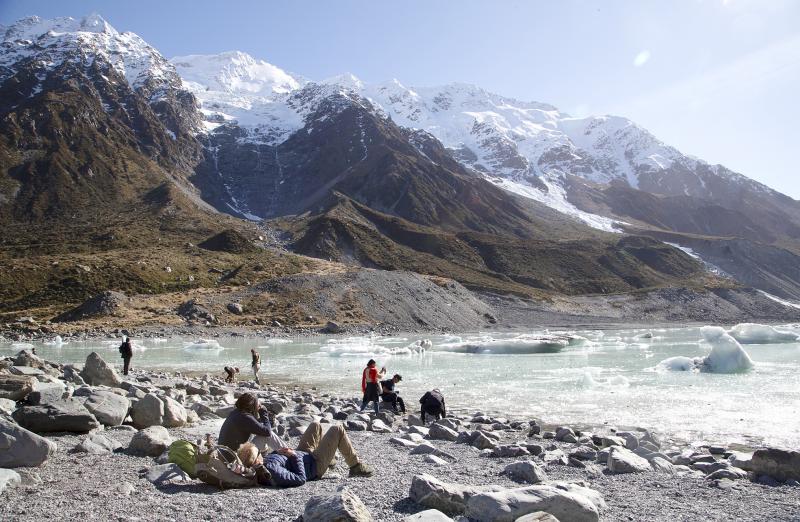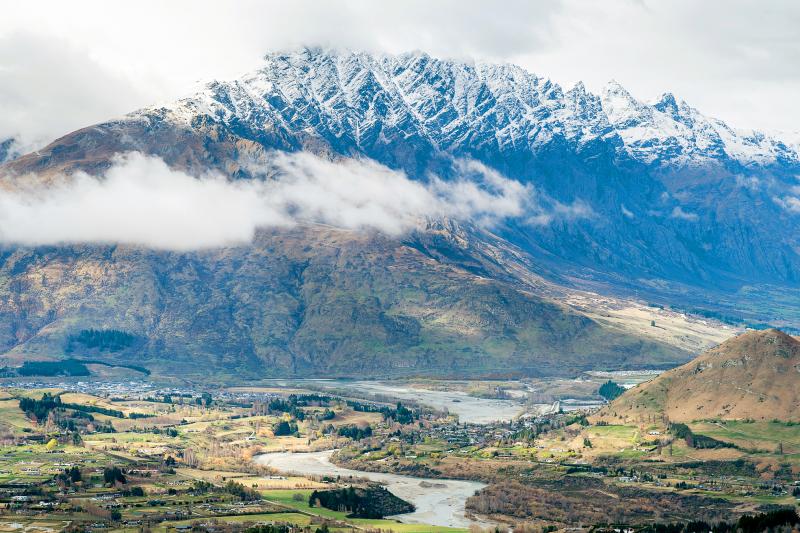When Dalilah Restrepo, then a New York-based physician, clicked on an e-mail in 2018 asking if she was “looking for experiencing something abroad”, she was skeptical. “And then I opened it, and I was like … New Zealand? Gosh, that’s a bit drastic.”
Restrepo, who had been in private practice for “10 or 11 years,” was exhausted.
“The health system in the US is really toxic,” she said. Health disparities and “moral injury” had caused burnout among her peers, she said, and before the suggestion that she leave the States, she had thought of quitting her profession altogether.

Photo: AP
In March 2019, Restrepo joined a growing number of medical professionals from the US relocating to New Zealand. They come with admiration for a society that values scientific knowledge, what they see as the prime minister Jacinda Ardern’s progressive political ideals, and the pristine landscapes made famous by Peter Jackson’s Lord of the Rings films.
“Everyone was like, ‘You’re going to heaven right? We’re really jealous,’” Restrepo said.
POPULAR PASSPORT

Photo: Bloomberg
The number of American doctors yearning for such a move, recruitment firms in the US and New Zealand say, has increased substantially since the COVID-19 pandemic. With their skills in demand they are among the few professions able to obtain entry to a country whose passport — according to an index this month – is the most powerful in the world.
“Some of the inquiries come from changes in their own employment due to COVID,” said Chad Saley, a spokesperson for Global Medical Staffing, a US-based firm that places American doctors abroad. “Others are interested in working there due to the country’s positive response to COVID.”
New Zealand has drawn global praise after appearing to quell the spread of COVID-19, twice — with just over 1,500 cases and 25 deaths. On the night of Donald Trump’s debate with Joe Biden this month, Google searches for how one might flee to New Zealand shot up.
Following Trump’s election in November 2016, New Zealand immigration officials said inquiries from Americans on their Web site had risen 24-fold. After the March 2019 terrorist attack in Christchurch — to which New Zealanders responded largely with empathy and compassion — interest jumped again.
The nation holds “a lot of mystery and allure,” Saley added. Since the government locked down the country in March in an attempt to quash the spread of the coronavirus, New Zealand was the most popular country for clients of his firm and interest had shot up, he said.
Even the Web site for New Zealand’s immigration agency appears pointed in its pitch to US citizens: “Looking for a change?” It reads. “Somewhere more relaxed, in a peaceful country where people look out for each other with services like subsidized healthcare?”
But most aspiring residents would be barred from making the move due to COVID-19; the country’s strict border controls allow only New Zealanders and their families to travel there — and even some in that category have been unable to obtain visas. Doctors can apply for special exemption if their skills are in demand in New Zealand.
Restrepo — an infectious diseases specialist in short supply here — moved to the small, rural city of Palmerston North; not New Zealand’s most picturesque or glamorous location and at times the butt of urbanites’ jokes. She didn’t care.
“Everyone said, New York city to Palmy, you’re going to die over there,” she said, using a local slang term for Palmerston North. “You’re never going to see culture, you’re a foodie, you like restaurants and shopping, what are you going to do there?
But Restrepo said she had not missed “a thing” about her old life. “I love this country and I have never been bored.”
RELOCATING
As the COVID-19 pandemic arrived in New Zealand, Restrepo — who was supposed to return home after a year — decided to stay and serve her adopted homeland. She hoped the move would one day become permanent, although she added that a recent trip back to the US — where her daughter was undergoing surgery — underscored the difficulty of relocating to an isolated country with closed borders, where the northern hemisphere is a full day of travel away.
Still, she says, friends and strangers constantly ask her about moving to New Zealand. And when entering the US during her recent visit, even a border official enthused about it.
“Before I knew it, I had a circle around me in JFK, and everyone was like, ‘New Zealand, you’re coming from New Zealand?’” Restrepo said. “Everyone just wanted to know about New Zealand.”
Others have similar stories. Judy Melinek — an author and forensic pathologist who moved to Wellington in July — was prompted by the country’s successes against COVID-19. In the US, her children attended school online and missed their friends; Melinek said she faced reckless disregard for safety protocols at work (not long after she moved to New Zealand, a former colleague caught the virus and died).
“I’d never been to New Zealand before moving here, but it was always on my list of places I’d love to go,” she said. “I’ve met Kiwis in the past and they’re the nicest people, and I’d watched all the Lord of the Rings movies.”
But the move had still been heart-wrenchingly difficult; she and her husband had left their adult children behind.
“You do it when you feel like you really don’t have a choice,” Melinek said.
“There are definitely more people looking to come here on a permanent basis,” said Kate McKendry, a spokesperson for the New Zealand-based medical recruitment firm NZDr; most of them were Americans.
Visa and medical registration paperwork often took six months or more to process, she said, so any growth in arrivals from the Covid-19 pandemic would not be fully quantifiable until next year. The immigration agency could not provide figures for the number of foreign medical professionals who had received visa exemptions since New Zealand closed its borders.
Melinek said New Zealand’s successes against the coronavirus could translate to booms in some sectors.
“The American failure to address COVID-19 adequately and the subsequent economic collapse that we are experiencing is going to drive not just physicians but other executives and entrepreneurs out of the country,” she said. “Anyone who’s got an advanced degree and international connections is already looking at other countries, if they haven’t already left.”
In some US news reports, New Zealand has taken on the air of fairytale; an article published by a Florida online news site this week described as benefits of relocating to New Zealand the “plentiful housing” (the country is in the grip of a housing shortage, with median house prices about seven times the median income), temperate climates (it depends on where you live) and “sheep everywhere” (not really).
But any problems haven’t deterred Americans. “It’s not perfect, but it’s trying to be,” said Restrepo, of her adopted home. “It gets points for that.”

Most heroes are remembered for the battles they fought. Taiwan’s Black Bat Squadron is remembered for flying into Chinese airspace 838 times between 1953 and 1967, and for the 148 men whose sacrifice bought the intelligence that kept Taiwan secure. Two-thirds of the squadron died carrying out missions most people wouldn’t learn about for another 40 years. The squadron lost 15 aircraft and 148 crew members over those 14 years, making it the deadliest unit in Taiwan’s military history by casualty rate. They flew at night, often at low altitudes, straight into some of the most heavily defended airspace in Asia.

Taiwan’s democracy is at risk. Be very alarmed. This is not a drill. The current constitutional crisis progressed slowly, then suddenly. Political tensions, partisan hostility and emotions are all running high right when cool heads and calm negotiation are most needed. Oxford defines brinkmanship as: “The art or practice of pursuing a dangerous policy to the limits of safety before stopping, especially in politics.” It says the term comes from a quote from a 1956 Cold War interview with then-American Secretary of State John Foster Dulles, when he said: ‘The ability to get to the verge without getting into the war is

Like much in the world today, theater has experienced major disruptions over the six years since COVID-19. The pandemic, the war in Ukraine and social media have created a new normal of geopolitical and information uncertainty, and the performing arts are not immune to these effects. “Ten years ago people wanted to come to the theater to engage with important issues, but now the Internet allows them to engage with those issues powerfully and immediately,” said Faith Tan, programming director of the Esplanade in Singapore, speaking last week in Japan. “One reaction to unpredictability has been a renewed emphasis on

Beijing’s ironic, abusive tantrums aimed at Japan since Japanese Prime Minister Sanae Takaichi publicly stated that a Taiwan contingency would be an existential crisis for Japan, have revealed for all the world to see that the People’s Republic of China (PRC) lusts after Okinawa. We all owe Takaichi a debt of thanks for getting the PRC to make that public. The PRC and its netizens, taking their cue from the Chinese Communist Party (CCP), are presenting Okinawa by mirroring the claims about Taiwan. Official PRC propaganda organs began to wax lyrical about Okinawa’s “unsettled status” beginning last month. A Global